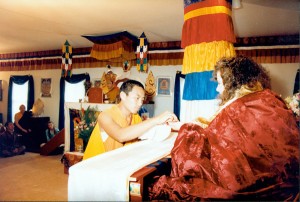
The following is respectfully quoted from “Reborn in the West” by Vicki Mackenzie
I was fortunate to see her. She had been engaged in a long retreat and was also suffering from the flu–yet she agreed to break her silence to talk with me. I was eager to hear this American dakini’s tale.
‘I’m really just a girl from Brooklyn,’ she began, eyes twinkling with humor. In fact there was little in her background to laugh about. She came from a poor family beset with problems. There was alcoholism, violence and abuse, which she was reluctant to say much about except that she was advised by the police to leave home when she was seventeen. ‘It was a very difficult situation, very difficult,’ she said quietly. ‘As soon as I was able to stand on my own two feet I left. But I did it all right. I managed pretty well,’ she added, wanting to make light of what was obviously a horrendous childhood.
“It was a very mixed religious household with quite a lot of tension surrounding belief. It’s a strange history. I didn’t know my father but my stepfather was Catholic. My mother’s parents were Austrian/Dutch Jews and when she married my stepfather, as she would not be Catholic, she decided that the Dutch Reform Church would be a good compromise between Judaism and Catholicism. She was what we called a ‘lox and begals’ Jew, a cultural Jew, who didn’t really know what was going on other than the food!” Jetsunma said with a deep, throaty laugh.
“I didn’t know my real father but my stepfather was Catholic.” There was a real battle in my house as to how the children should be raised. When my stepfather was winning I was Catholic, which meant I was baptized a Catholic and went to Catholic school where I was taught catechism and the rest. When my mother was winning, or when she could absolutely stand no more of the nuns, she would take me out of catechism and put me into the Dutch Reform Church.’
It seemed to me in the light of the what was to follow that her background, hard though it was, probably helped shape her destiny. The violence in her home must have honed her sensibilities to the suffering of the world, both mental and physical, while her Judaeo-Christian schooling would have given her a first-hand knowledge of the very roots of our Western civilization–an invaluable asset when teaching the principles of avery different belief. Jetsunma would know from personal experience the background of most of her audience.
She was a naturally spiritual child, she continued, with a reverence for Jesus which abides to this day. ‘I feel an enormous devotion for him. I think he is one of the greatest bodhisattvas of the world,’ she said. But she also had an inexplicable attraction to Buddha statues. ‘I use to buy them all the time and either give them to my mother or keep them for myself. I remember when I went through my hippy phase I had my room decorated in psychedelic Buddhist posters and had a Buddhist altar. I had an affinity to it. I liked the simplicity. I didn’t know anything about Buddhism, to tell you the truth, but there was something about it that felt normal.’ She also remembers having beatific visions at the age of ten on her top bunk. And she had prayers that were all her own.
In spite of her innate spirituality she found nothing in either churches or synagogues to attract her. ‘I didn’t like the way religion was practiced in our country,’ she said. ‘It seemed like a vapid experience. People did not seem to pick up any clues from it as to how to live their lives. I don’t ever remember, for instance, being told to care for all sentient beings. I was told to be a good girl, a nice girl, which boiled down to morality. We all knew what good and nice girls didn’t do!” she said.
‘Certainly in my family I noticed that those same parents who could go to church and do all the right things could come home and beat the stew out of their kids, in the same day! To my mind there was something desperately wrong with that–especially when I was the one getting the stew beaten out of me. For a while got really angry with “religion’ and rebelled against it.’
One thing is sure. In this very eclectic religious and radical background that shaped Jetsunma’s early life, there was absolutely no hint of the Tibetan Buddhism which was to emerge so brightly, of its own accord, later in her life. No secret influence, no teachings could be discerned that would explain the emergence of the pure Buddhist philosophy that was to spring automatically from her lips.
